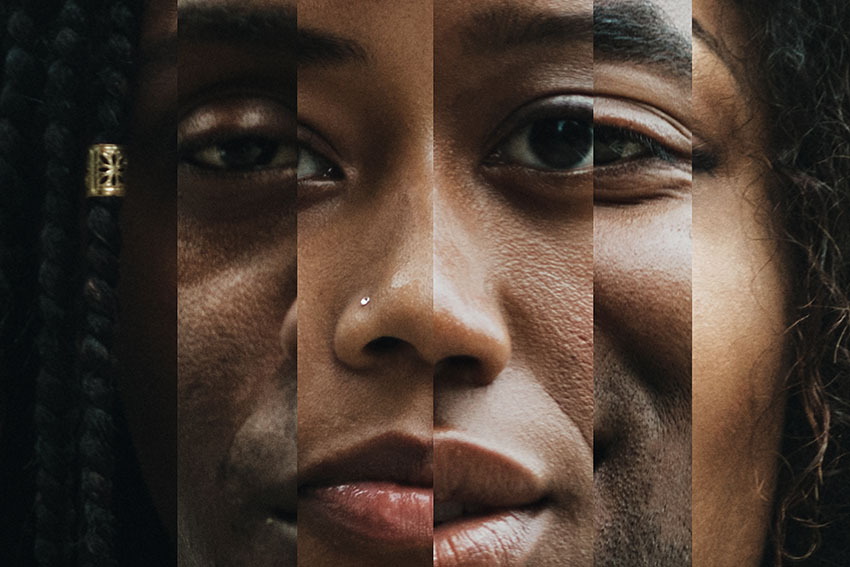
The image was selected by the authors. Dr. Maragh-Bass is a former HIV Prevention Trials Network (HPTN) Domestic Scholar and a current FHI 360 Scientist. Mr. Louis B. Shackelford is a Project Manager in External Relations with the COVID-19 Prevention Network (CoVPN) and HIV Vaccine Trials Network (HVTN). This image reiterates the intention of the blog in promoting accurate and multifaceted portrayals of COVID-19 vaccine “hesitancy” among Black Americans.
As Black American public health professionals, we know that one pervasive question for Black Americans today is, “So, are you getting the COVID vaccine?”
There is not an easy answer. Black Americans are more likely to get COVID-19 than other races and are dying at nearly twice the rate of White Americans. They are also less likely to participate in COVID-19 vaccine clinical trials and are less willing to get the vaccine. All the same, these numbers portray problems in our society, not problems with Black people.
We should look through the lens of lessons learned when Black Americans are left behind in public health preparedness. For instance, many parallels exist between HIV and COVID-19: Black Americans are also more likely to get HIV, less likely to participate in HIV clinical research and less likely to benefit from HIV prevention medications than other communities. While other communities mounted a response to the COVID-19 pandemic, many Black Americans navigated intersectional COVID-19, HIV, racial discrimination and poverty.
What have we learned from both cases?
- Words, images and perceptions matter. We are inundated daily with headlines about COVID-19 vaccine “distrust” or “hesitancy” among Black Americans. But, what is the difference, and does it matter? In short, yes.
Vaccine hesitancy is broadly defined as a continuum from vaccine refusal to acceptance. The headlines using this phrase imply personal preferences and views. However, there is plenty of literature that shows our individual decision-making to get vaccinated may be reduced because of seeing these very images telling us that Black Americans are not getting vaccinated. Very few of these headlines identify trustworthy sources for Black Americans to go for information about the vaccines. Even fewer headlines discuss the role of clinicians and researchers in working to overcome distrust and negative perceptions of the vaccine and in encouraging trust in vaccinations.
- Trust is central to uptake. Whether we portray it as hesitancy, mistrust, distrust or any other term, every Black American needs access to information about the vaccine and side effects. They need to know why some groups are eligible to be vaccinated before other groups and why high rates of vaccination are needed for everyone to be protected (community, or herd, immunity). Black Americans are rightly distrustful of the short timeline to COVID-19 vaccine approval and production. There is not a single community in which we, the authors, have worked, whether on COVID-19 or HIV, where the legacy of ethical violations such as the Tuskegee study or Henrietta Lacks is not mentioned. If public health practitioners are not appropriately equipped to help Black Americans overcome these valid concerns, how can trust be built and vaccine acceptance be promoted successfully? Acknowledging these very real concerns, as the U.S. Surgeon General did, is a start in trust building, but we must continue to provide education about the process through which the vaccine was tested and produced.
- Address the issue of access. Across the media, we see portrayals of vaccine hesitancy in Black American communities, often with little to no effort to balance reporting on vaccine scarcity due to lack of access. Stories abound of Black American communities where low vaccine stock is to blame for low rates of vaccination, not hesitancy. Additionally, structural racism has guaranteed Black Americans a poorer quality of care than others, even when they are willing to seek care. Even before vaccine availability, there were disparities in access to COVID-19 testing.
Public health practitioners must take cues from people already leading these efforts so as not to dilute or duplicate; many of these leaders have worked in HIV prevention and know the pitfalls of repeating the errors of the past. Media outlets should also ensure accurate and balanced reporting that frames the whole community, not just one narrative of hesitancy. Partnering with Black churches and having Black researchers and clinicians in leadership roles in entities like the COVID-19 Prevention Network, the National COVID-19 Resiliency Network and the Black Coalition Against COVID can prioritize engagement in Black American communities and go a long way toward building on assets and promoting vaccinations.
So, are we getting the COVID-19 vaccine? One of us already has and one of us will, to protect ourselves and our community. How about you?
